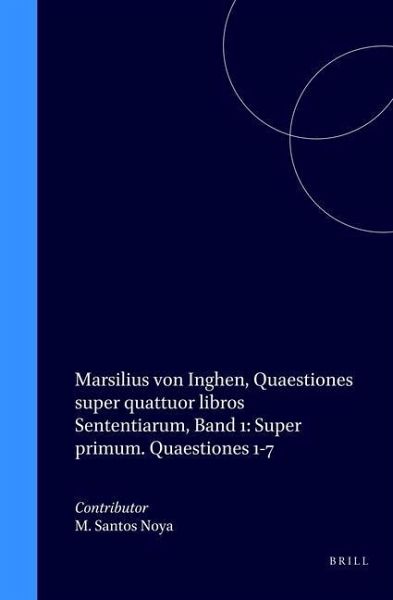Nicht lieferbar

Marsilius Von Inghen, Quaestiones Super Quattuor Libros Sententiarum, Band 1: Super Primum. Quaestiones 1-7
Versandkostenfrei!
Nicht lieferbar
Marsilius of Inghen, master of the Universities of Paris (1362-1378) and Heidelberg (1386-1396), is the author of a number of highly successful treatises on logic and natural philosophy which were read at many Late Medieval and Early Modern universities. The fruit of his mature thinking is a monumental commentary on the Sentences of Peter Lombard, which he published shortly before his death in 1396. This huge piece of writing is now being critically edited for the first time by an international team of specialists. The first volume provides a discussion of the nature of theology and deals with...
Marsilius of Inghen, master of the Universities of Paris (1362-1378) and Heidelberg (1386-1396), is the author of a number of highly successful treatises on logic and natural philosophy which were read at many Late Medieval and Early Modern universities. The fruit of his mature thinking is a monumental commentary on the Sentences of Peter Lombard, which he published shortly before his death in 1396. This huge piece of writing is now being critically edited for the first time by an international team of specialists. The first volume provides a discussion of the nature of theology and deals with the logical and theological problems of the divine trinity. Modern research can profit from the broad scope with which Marsilius addresses his topics. His arguments shed light on the discussion between nominalists and realists, allowing insight into the changing interests of philosophy and theology, from the critical attitude of many 14th-century authors to the search for tradition which was characteristic of the 15th century. Marsilius adopts the logico-semantic approach of William of Ockham, Adam Wodeham, and Robert Holcot, while at the same time defending the traditional views of Thomas Aquinas and Bonaventure. Assimilating these different theories, his commentary reflects the multiform nature of its late medieval intellectual context. The whole edition will cover seven volumes, including a separate volume with indices of the complete text and a bibliography of literature on Marsilius. Each volume will contain an introduction, an index of relevant names, and a subject index.



